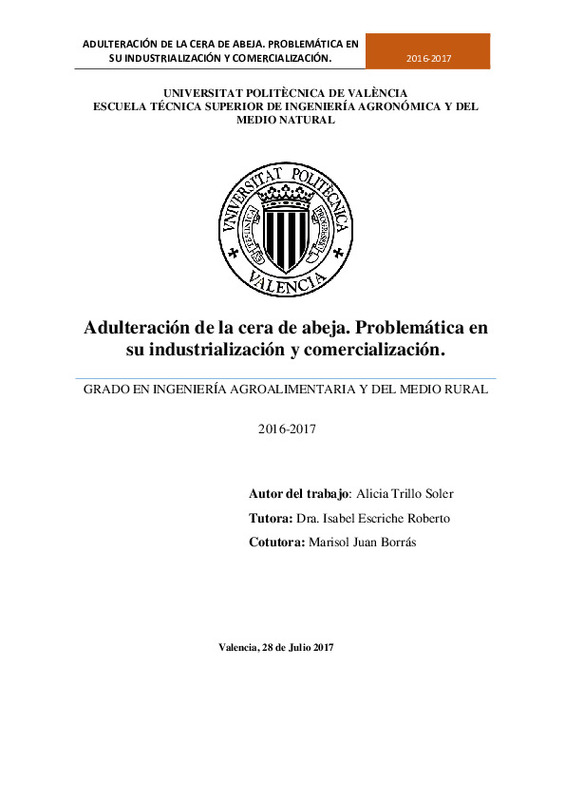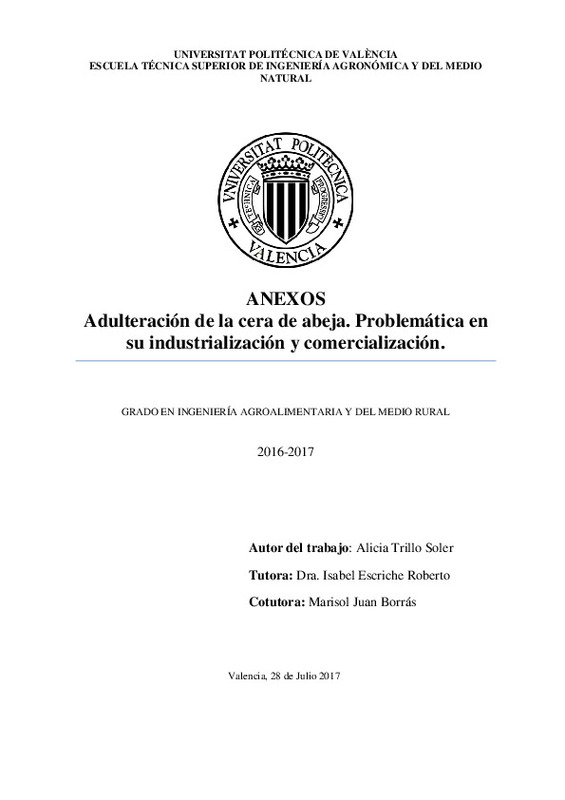JavaScript is disabled for your browser. Some features of this site may not work without it.
Buscar en RiuNet
Listar
Mi cuenta
Estadísticas
Ayuda RiuNet
Admin. UPV
Adulteración de la cera de abeja. Problemática en su industrialización y comercialización
Mostrar el registro sencillo del ítem
Ficheros en el ítem
| dc.contributor.advisor | Juan Borrás, María del Sol
|
es_ES |
| dc.contributor.advisor | Escriche Roberto, Mª Isabel
|
es_ES |
| dc.contributor.advisor | Visquert Fas, Mario
|
es_ES |
| dc.contributor.author | Trillo Soler, Alicia
|
es_ES |
| dc.date.accessioned | 2017-10-04T15:53:22Z | |
| dc.date.available | 2017-10-04T15:53:22Z | |
| dc.date.created | 2017-09-15 | |
| dc.date.issued | 2017-10-04 | es_ES |
| dc.identifier.uri | http://hdl.handle.net/10251/88698 | |
| dc.description.abstract | [ES] The adulteration of beeswax is increasingly worrying the beekeeping sector. It is a natural product of the hive in which the incorporation of any substance is considered a fraudulent practice. The industrial sheets of beeswax are used by beekeepers to help the formation of new combs, sometimes observing the rejection of these sheets by the bees. This implies an important economic loss, since these sheets have to be replaced by new ones, and more important, it diminishes the performance of the beehive as far as the production of honey and the development of the hatchlings. One of the most likely probabilities of this rejection is the incorporation of cheaper products into beeswax: synthetic (such as paraffin) or vegetable waxes (such as carnauba wax), among others. These practices take place during the manufacture of stamped sheets since the cost of beeswax is considerably higher of these adulterating products, which makes it attractive to adulterate. Thus, the objective of this study has been generated information about the quality of stamped wax being used by the Spanish beekeeping sector. For this reason, samples of waxes from different origins (Valencia, Teruel, Others and Company) and types (Operculum, Bresca and Sheet) have been analyzed. The physicochemical, acidity and especially density parameters, established as indicators of quality, have not been suitable for the differentiation between pure beeswax and adulterating products such as carnauba wax and paraffins. However, the ratio of ¿odd-numbered / ¿odd-carbon hydrocarbons (Carbon Preference Index-CPI), obtained by chromatography (GC-FID), allows differentiating samples of adulterated beeswax and estimating the level of adulteration present in relation to the quantity of paraffins. As expected, the most frequently adulterated bee waxes have been stamped sheets from companies. The use of this index minimizes the problems that exist in the sector in relation to the industrialization and commercialization of beeswax. That prevents the entry of adulterated wax in the recycling chain and therefore the subsequent use of inappropriate sheets by the beekeeping sector. | es_ES |
| dc.description.abstract | [EN] The adulteration of beeswax is increasingly worrying the beekeeping sector. It is a natural product of the hive in which the incorporation of any substance is considered a fraudulent practice. The industrial sheets of beeswax are used by beekeepers to help the formation of new combs, sometimes observing the rejection of these sheets by the bees. This implies an important economic loss, since these sheets have to be replaced by new ones, and more important, it diminishes the performance of the beehive as far as the production of honey and the development of the hatchlings. One of the most likely probabilities of this rejection is the incorporation of cheaper products into beeswax: synthetic (such as paraffin) or vegetable waxes (such as carnauba wax), among others. These practices take place during the manufacture of stamped sheets since the cost of beeswax is considerably higher of these adulterating products, which makes it attractive to adulterate. Thus, the objective of this study has been generated information about the quality of stamped wax being used by the Spanish beekeeping sector. For this reason, samples of waxes from different origins (Valencia, Teruel, Others and Company) and types (Operculum, Bresca and Sheet) have been analyzed. The physicochemical, acidity and especially density parameters, established as indicators of quality, have not been suitable for the differentiation between pure beeswax and adulterating products such as carnauba wax and paraffins. However, the ratio of ¿odd-numbered / ¿odd-carbon hydrocarbons (Carbon Preference Index-CPI), obtained by chromatography (GC-FID), allows differentiating samples of adulterated beeswax and estimating the level of adulteration present in relation to the quantity of paraffins. As expected, the most frequently adulterated bee waxes have been stamped sheets from companies. The use of this index minimizes the problems that exist in the sector in relation to the industrialization and commercialization of beeswax. That prevents the entry of adulterated wax in the recycling chain and therefore the subsequent use of inappropriate sheets by the beekeeping sector. | es_ES |
| dc.language | Español | es_ES |
| dc.publisher | Universitat Politècnica de València | es_ES |
| dc.rights | Reserva de todos los derechos | es_ES |
| dc.subject | Bee wax | es_ES |
| dc.subject | Adulteration | es_ES |
| dc.subject | Paraffin | es_ES |
| dc.subject | Carnauba wax | es_ES |
| dc.subject | Beekeeping sector | es_ES |
| dc.subject | Cera de abeja | es_ES |
| dc.subject | Adulteración | es_ES |
| dc.subject | Parafinas | es_ES |
| dc.subject | Cera carnauba | es_ES |
| dc.subject | Sector apícola | es_ES |
| dc.subject.classification | TECNOLOGIA DE ALIMENTOS | es_ES |
| dc.subject.other | Grado en Ingeniería Agroalimentaria y del Medio Rural-Grau en Enginyeria Agroalimentària i del Medi Rural | es_ES |
| dc.title | Adulteración de la cera de abeja. Problemática en su industrialización y comercialización | es_ES |
| dc.type | Proyecto/Trabajo fin de carrera/grado | es_ES |
| dc.rights.accessRights | Abierto | es_ES |
| dc.contributor.affiliation | Universitat Politècnica de València. Escuela Técnica Superior de Ingeniería Agronómica y del Medio Natural - Escola Tècnica Superior d'Enginyeria Agronòmica i del Medi Natural | es_ES |
| dc.contributor.affiliation | Universitat Politècnica de València. Departamento de Tecnología de Alimentos - Departament de Tecnologia d'Aliments | es_ES |
| dc.description.bibliographicCitation | Trillo Soler, A. (2017). Adulteración de la cera de abeja. Problemática en su industrialización y comercialización. http://hdl.handle.net/10251/88698. | es_ES |
| dc.description.accrualMethod | TFGM | es_ES |
| dc.relation.pasarela | TFGM\71952 | es_ES |
Este ítem aparece en la(s) siguiente(s) colección(ones)
-
ETSIAMN - Trabajos académicos [3278]
Escuela Técnica Superior de Ingeniería Agronómica y del Medio Natural







